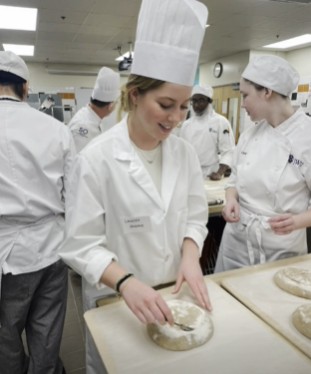Lauren Shamie, 2024
Spring Break at JWU: Student Experiences

Spending my spring break at Johnson and Wales University was an experience that perfectly blended my interest in the culinary arts with the perspective of a dietetics student pursuing a Master of Science in Clinical Nutrition with a dietetic internship. Located in Providence RI, the setting was perfect for exploring the city and immersing ourselves in the culinary scene that seamlessly lay within.
Our first day started with a warm welcome from Dean Marshall, who provided us with an overview of our schedule and gave us a tour of the campus. What struck me immediately was how the classrooms were mostly centered around the kitchens, highlighting the practical, hands-on aspect of culinary education. We enjoyed a global-themed lunch prepared by Global a la carte students, drawing inspiration from Brazilian, Peruvian, and Argentinian cultures. It was not only a delicious meal but also an opportunity to observe students practicing their front and back of house skills, which was fascinating. To finish the first day, we attended Therapeutic Cuisines, which I found particularly interesting, especially from a dietetics perspective. We spent the first half of class focusing on cardiovascular health and then put this knowledge into action creating heart-healthy meals. This intersection of culinary skills and clinical nutrition provided a unique insight into how the culinary arts can be employed to serve therapeutic purposes.
The following days and classes were equally engaging to be a part of the cooking processes and stand alongside the JWU students, which not only allowed me to learn new culinary techniques but also gain further insights into the sensory, cultural, communal, and nutritional aspects of food. We participated in classes such as Regenerative Food Ways, Cooking for Health & Wellness, Plated Desserts, Contemporary Cooking, and Ancient Grains & Hearth Breads. The bread-making class was definitely a personal favorite as it is something that has always fascinated me. The aroma of freshly baked bread filled the room as we ground fresh grains, scored, shaped, and even cut up some of the bread mid-class to enjoy together. The experience was simply unforgettable! All the chefs and students were incredibly welcoming and kind, sharing their knowledge and expertise to create an educational and exciting learning environment. Their enthusiasm was contagious, making every class, cooking session, and meal a truly memorable and fun experience.
Our visit to the Thursday bake sale was a delightful way to wrap up the trip but also a testament to the institution’s commitment to sustainability. At the bake sale, they sell the student-made baked goods at market price, effectively diverting food waste and putting it back into the system. It was impressive to see how the school integrated sustainability practices into their culinary education. Witnessing this, along with many other sustainability efforts, underscored the school’s dedication to minimizing food waste, aligning with many principles of a future in dietetics and nutrition. As I left Johnson & Wales, I took with me a deeper understanding of the culinary world, how it can be utilized to promote healthy food choices, and the invaluable knowledge that will shape my career as a future dietitian.